You live on the East Side of Athens, Georgia. You don’t own a car, you can’t afford ride sharing services and few of your neighbors have cars. To get to work, school or doctors appointments, you rely on Athens Transit.
Because the bus is your only way around, you don’t leave the East Side very often. Although the bus system covers Athens-Clarke County, several stops are only serviced once an hour, and switching routes can be time-consuming. A friend gave you a bike to use, but it needs repairs you can’t afford. Even if it did work, you’re nervous about a lack of sidewalks and bike paths.
Scott Long of BikeAthens is no stranger to situations like yours. As the nonprofit’s executive director, he sees people with similar concerns every day. In response, BikeAthens is working to build equity and encourage safety in transportation.
Why It’s Newsworthy: In May 2022, voters in Athens-Clarke County will decide whether to approve a transportation special local option sales tax that funds many transportation infrastructure projects. This story provides context on how and why funds from that tax may be utilized to expand transportation networks and improve safety for bikers and pedestrians.
Established as a nonprofit in 1992, BikeAthens runs a bike donation and redistribution program. educates cyclists on safe riding and hosts weekly “Fix Your Own Bike” (FYOB) events for people who can’t afford or don’t know how to repair their bikes.
The ability to get from place to place can impact the relationships and resources a person can acquire, according to a 2018 transportation report from MDC, a community development organization formerly called Manpower Development Corp.
In advocating for equity, BikeAthens considers that “affordable, accessible transportation is a critical component of social and economic mobility,” BikeAthens’ website says. A national survey from Portland State University found that 51% of people in the U.S. are interested in biking more but have concerns about safety. Traffic fatality data may give reason for their concerns.
Pedestrians and bicyclists represent less than a percent of individuals involved in Georgia’s motor vehicle crashes, but they are involved with 17% of traffic fatalities, according to a 2019 report from the Georgia Governor’s Office of Highway Safety. Between 2015 and 2019, 15 of those fatalities occurred in Clarke County, a 2019 county fact sheet said.
Loud, Angry and Funded
“Basically, we were just the loud, angry people that everyone else wanted to shut up,” Long, BikeAthens’ executive director said at a Sept. 9 FYOB event.
As a result of being loud and angry, the Athens-Clarke County government has dedicated funds to expanding transportation infrastructure through a transportation special local option sales tax, better known as TSPLOST.
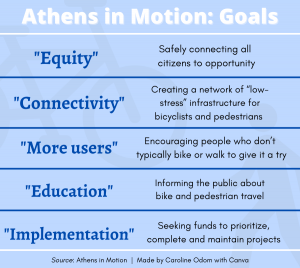
If TSPLOST 2023 is approved by Athens-Clarke County voters, sales tax will remain at its current level of 8%, which includes the 1% addition from TSPLOST 2018. Without TPLOST 2023, sales tax will decrease to 7%.
On Sept. 7, Athens-Clarke County’s commissioners and mayor Kelly Girtz approved infrastructure projects for Atlanta Highway and Lexington Road, each with a $4 million budget, Sizemore said.
As the 2018 round of TSPLOST approaches its $109.5 million cap, the TSPLOST advisory committee, of which Long is a member, is considering projects for TSPLOST 2023. The committee is accepting public comments on the projects and will start reviewing comments on Oct. 15. After the committee chooses from 91 proposed projects, Athens-Clarke citizens will have a chance to vote on TSPLOST 2023 on May 24, 2022, Long said.
Missing the Bus
The League of American Bicyclists considers Athens one of the 12 bicycle friendly communities in Georgia, but that may depend on where you live in Athens.
Irene Ivie, a second-year master’s student at the University of Georgia and vice president of the BikeAthens board, is a commuter cyclist. She rides her bike because it’s budget friendly, and she enjoys seeing more of Athens.
But at an FYOB night, Ivie acknowledged that she has the choice to ride her bike every day while her car sits in her driveway at home. Not all Athens residents have that choice.
“If you don’t have a car, you have to have a bike in Athens,” Ivie said. “Public transport isn’t robust enough here to get you to work on time. Most Athens transit buses only come once an hour. So if you miss one, you know, that’s kind of toast.”
Residents who do have bikes may be forced to ride on poor or unsafe infrastructure, Ivie said. Although Milledge Avenue is flat, a lack of bike lanes and abundance of fast cars creates hazards. Baxter Street has bike lanes that meet the minimum required width, but storm drains occasionally impede the lanes.
“Greater amounts of interconnectivity and … more thoughtful placement of bike infrastructure would be nice,” Ivie said.
A Living Document
Enter the Athens in Motion (AIM) plan, a work plan developed by Athens-Clarke County to build bicycle and pedestrian facilities. Long represents BikeAthens as an ex officio member of the Athens in Motion commission, a citizen committee that advises the mayor and commissioners, Long said.
Completed in 2019, AIM is a “living document,” Daniel Sizemore, Athens-Clarke County’s bicycle, transportation and safety coordinator, said on a Zoom call. AIM’s primary goals include connectivity, equity, more users, education and implementation.

“If you’re guiding neighborhoods and communities to Atlanta Highway or West Broad, and then you’re met with just grass medians with no sidewalks and no accessibility, what can you do now?” Sizemore said. “Focus on laying those main foundations … to make it as safe and accessible for as many people as you can, and then tie … communities in.”
A Breadth of People
AIM prioritizes its 117 potential projects with a weighting system that considers demand, accessibility, user comfort-level and public input. But public input can be hard to come by, Sizemore said.
“You can’t force people to respond to surveys. You can only reach the audience that wants to be engaged,” Sizemore said. “There’s a lot of disenfranchised communities who are tired of government or don’t trust government, and they don’t necessarily want to be involved in commissions or groups.”
That’s where BikeAthens comes in.
“I don’t know any other shop around here that serves the breadth of people this shop does,” said John Wares, a UGA genetics professor and former BikeAthens board member, while sitting at a picnic table outside the BikeAthens shop. “You don’t get nearly the breadth of people, the breadth of income, the breadth of all sorts of backgrounds.”
When BikeAthens interacts with this diverse community through bike donations, FYOB events or collaborating with other Athens nonprofit organizations, BikeAthens learns about their concerns and desires.
Through these relationships, BikeAthens and Long can carry concerns to the AIM commission.
“The quickest way that you can lift somebody out of poverty is to give them access to transportation,” Long said. “I see it every day,” Long said.
What’s Working
-
Chicago’s Unique Bike Giveaway Program Is a Win for Mobility Justice
The Bike Chicago program promotes active transportation and targets mobility hardship — common within working-class communities — by providing access to free bikes. The program launched in 2022 and has distributed over 2,000 bikes out of its 5,000 goal — with plans to continue distributing through 2026. After receiving a bike, about 12% of recipients report riding it almost daily, while 28% rides it three to five times a week.
What’s Next?
Even with funding from TSPLOST 2018, limited resources like time and staff impact how quickly projects can be accomplished, Sizemore said. With that funding, the question is, “How many projects can we do in five years?”
In 2023, Athens-Clarke County will revisit AIM and revise the document to reflect progress, updates and shifts in priority, Sizemore said.
Projects and processes take a long time, but that’s how funding in local government works, Long said. He’s glad to see steps being taken.
“It’s nice to be invited to sit at the table,” Long said. “That wasn’t always the case for BikeAthens and bike advocacy in general.”
Caroline Odom is a senior majoring in journalism and risk management and insurance with a certificate in personal and organizational leadership.


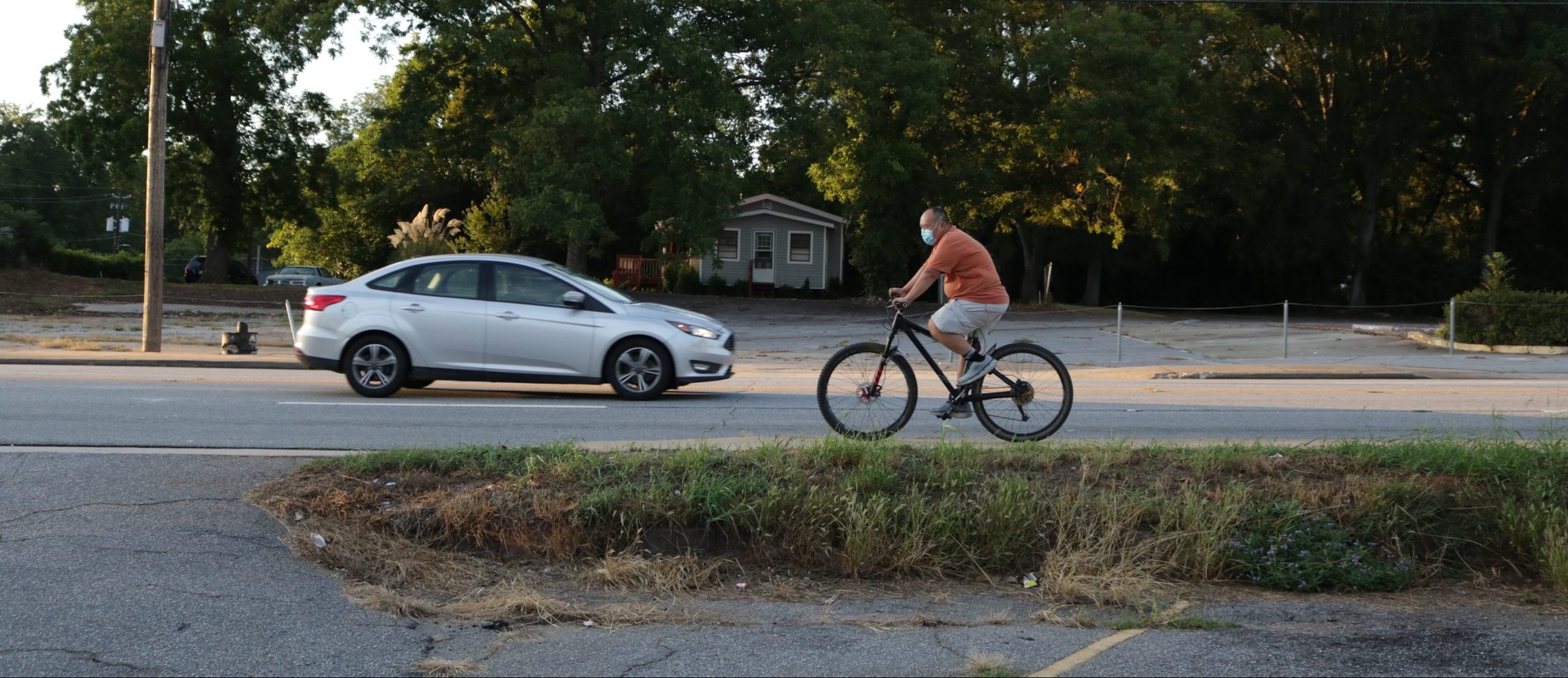

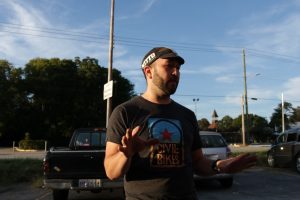
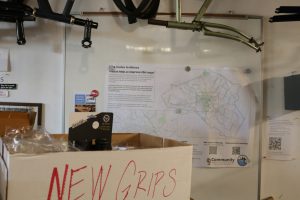

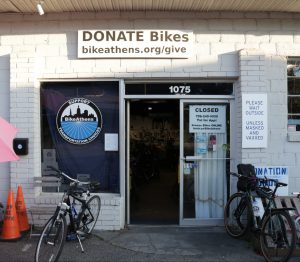
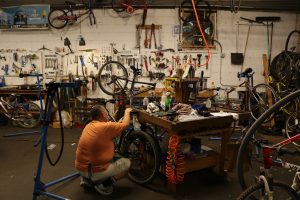


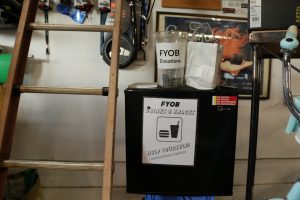
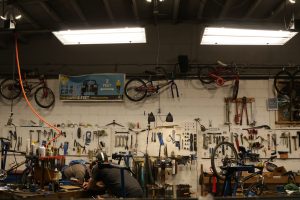






Show Comments (1)
Joshua
BikeAthens, a non-profit organization, is dedicated to promoting and improving alternative transportation options in Athens and the surrounding areas. With a strong focus on cycling, the organization is committed to creating a more sustainable and bike-friendly community.
Recognizing the numerous benefits of cycling, BikeAthens strives to make biking a safe, accessible, and convenient mode of transportation for all residents. The organization works tirelessly to advocate for the development of bike lanes, multi-use paths, and bike-friendly infrastructure, aiming to create a comprehensive network that connects key destinations and encourages active transportation.
Through community engagement and educational programs, BikeAthens empowers individuals with the knowledge and skills necessary to confidently navigate the streets on two wheels. The organization offers cycling safety workshops, bike maintenance classes, and other resources to promote responsible and enjoyable cycling practices.
BikeAthens actively collaborates with local government agencies, urban planners, and community stakeholders to integrate cycling into the overall transportation framework. By participating in transportation planning processes and advocating for policy changes, the organization strives to ensure that cycling is recognized as a viable and integral part of the transportation system.
In addition to their advocacy and education initiatives, BikeAthens is also involved in various community projects. The organization organizes group rides, community events, and bike-related fundraisers to foster a sense of camaraderie among cyclists and engage the wider community in the benefits of alternative transportation.
The work of BikeAthens is driven by a deep belief in the transformative power of sustainable transportation. By encouraging individuals to choose cycling as a mode of transportation, the organization aims to reduce traffic congestion, improve air quality, enhance public health, and create a more vibrant and livable city for all.
Through their tireless efforts, BikeAthens is laying the foundations for a transportation system that prioritizes sustainability, community well-being, and accessibility. By promoting cycling as a viable and attractive alternative, the organization is contributing to a future where active transportation plays a central role in shaping a more sustainable and connected Athens.
Thanks for posting this blog which is useful & intresting.